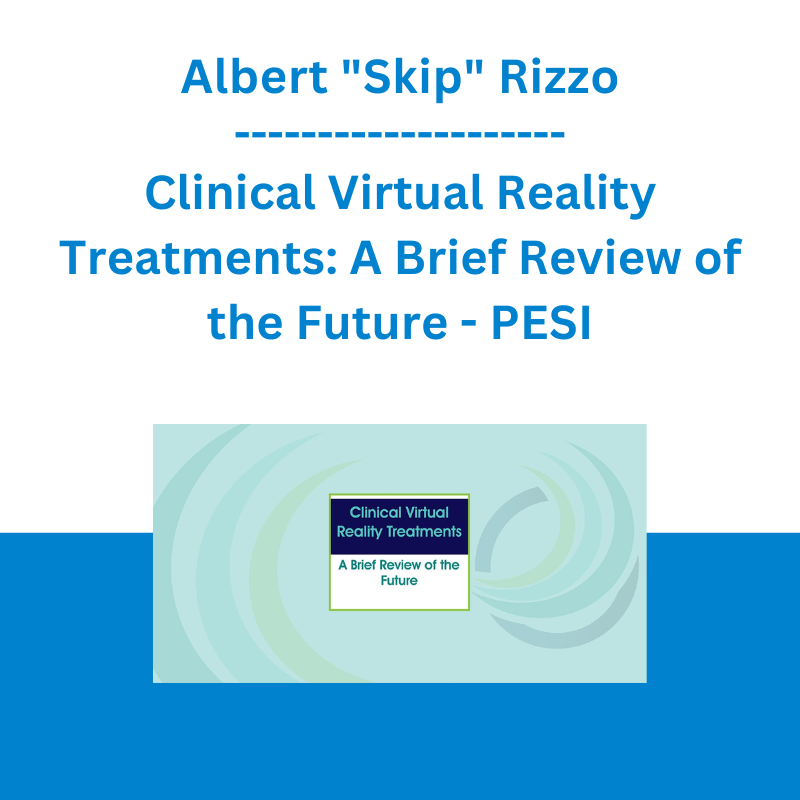*** Proof of Product ***
Exploring the Essential Features of “Albert “Skip” Rizzo – Clinical Virtual Reality Treatments: A Brief Review of the Future – PESI”
Clinical Virtual Reality Treatments: A Brief Review of the Future
Speaker: Albert “Skip” Rizzo, PhD
Duration: 1 Hour 16 Minutes
Format: Audio and Video
Description
Since the mid-1990s, significant scientific literature has evolved regarding the outcomes from the use of what we now refer to as Clinical Virtual Reality (VR). This use of VR simulation technology has produced encouraging results when applied to address cognitive, psychological, motor, and functional impairments across a wide range of clinical health conditions. This recording will provide a brief description of the various forms of VR technology and describe the trajectory of Clinical VR over the last 25 years addressing health and clinical treatment of anxiety disorders, PTSD, pain management, autism, and in the assessment/rehabilitation of stroke, brain injury, and other neurologically-based conditions. While there is still much research needed to advance the science in this area, I will make the case that Clinical VR applications will soon become indispensable tools in the toolbox of healthcare researchers and practitioners and will only grow in relevance and popularity in the near future.
Speaker
Albert “Skip” Rizzo, PhD
Albert “Skip” Rizzo, PhD, is a clinical psychologist and Director of Medical Virtual Reality at the University of Southern California Institute for Creative Technologies. He is also a Research Professor with the USC Dept. of Psychiatry and at the USC Davis School of Gerontology. Over the last 25 years, Skip has conducted research on the design, development and evaluation of Virtual Reality systems targeting the areas of clinical assessment, treatment and rehabilitation across the domains of psychological, cognitive and motor functioning in both healthy and clinical populations. This work has focused on PTSD, TBI, Autism, ADHD, Alzheimer’s disease, stroke and other clinical conditions. Some of his recent work has involved the creation of artificially intelligent virtual human (VH) patients that novice clinicians can use to practice skills required for challenging diagnostic interviews and for creating online virtual human healthcare guides, and clinical interviewers with automated sensing of facial, gestural, and vocal behaviors useful for inferring the state of the user interacting with these virtual human entities. In spite of the diversity of these clinical R&D areas, the common thread that drives all of his work with digital technologies involves the study of how interactive and immersive Virtual Reality simulations can be usefully applied to address human healthcare needs beyond what is possible with traditional 20th Century tools and methods.
Speaker Disclosures:
Financial: Albert “Skip” Rizzo is the founder of Virtual Psychedelics and has an employment relationship with the University of Southern California. He receives royalties as a published author. Albert “Skip” Rizzo receives grants from the Veterans Health Administration and the National Institutes for Health. He is a consultant for Penumbra and Cognitive Leap. serves as a scientific advisor for Attune Media, Pear Therapeutics, MyndVR, TrippVR, Luminopia, and Magic Horizons. Albert “Skip” Rizzo receives a speaking honorarium and recording royalties from PESI, Inc. All relevant financial relationships with ineligible organizations have been mitigated.
Non-financial: Albert “Skip” Rizzo is a member of the American Psychological Association, the International Neuropsychological Society, and the Association for Behavior and Cognitive Therapy.
Objectives
- Analyze Virtual Reality (VR) and the different ways that people can engage and interact with VR environments.
- Distinguish the specific rationales for the use of VR in the assessment and rehabilitation of a wide range of clinical disorders (i.e., ADHD, PTSD, Alzheimer’s, Phobias, Stroke, addictions, etc.).
- Determine the relevant issues involved in the design, development, implementation, and evaluation of virtual environments for use in assessment and rehabilitation.
Outline
- Clinical Virtual reality “Ingredients” What is it?
- The Ultimate Skinner Box
- Expose, Distract, Motivate, Measure & Engage
- Theoretical Basis & Research Support For Use
- Anxiety, Addiction, & PTSD
- Pain Management & Discomfort Reduction
- Physical/Cognitive Assessment & Rehabilitation – Stroke, Brain/Spinal Injury, Neurological Disorders
- Virtual Human Interaction for Clinical Training, Role Playing, and promoting access to healthcare.
- Pragmatics & The Future
- Breaking down Barriers to Care
- Faster, Better, Cheaper
- Ethical issues: Standard VR Issues + Clinical Guidelines
Target Audience
- Counselors
- Social Workers
- Psychologists
- Psychotherapists
- Therapists
- Marriage & Family Therapists
- Addiction Counselors
- Case Managers
- Physicians
- Nurses
- Other Mental Health Professionals
Please see the full list of alternative group-buy courses available here: https://lunacourse.com/shop/










 Atlas API Training - API 570 Exam Prep Training Course
Atlas API Training - API 570 Exam Prep Training Course